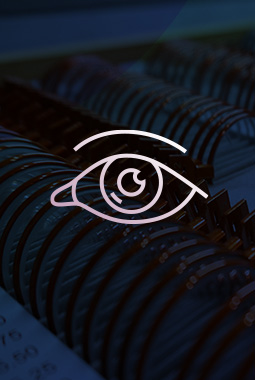Accidents Happen—Let Us Help
Eye injuries or trauma to the eye area can be stressful and frightening. Your eyesight is precious, and anything that might put it at risk needs to be dealt with immediately.
Whether it's a knock from a stray ball during the game time or a splash of cleaning supplies at home, knowing where to turn for emergency support is crucial for adults and kids alike.
When an accident occurs, call our office right away. We can assess your situation and recommend the next steps, whether that be coming to see an optometrist or going directly to an emergency room.
If our office is closed, you should proceed to your nearest hospital.
Book Appointment OnlineTypes of Eye Emergencies
Common eye emergencies we can treat include:
- Corneal abrasions (scratches)
- Foreign objects stuck in the eye
- Chemical splashes or burns
- Infections like conjunctivitis (pink eye)
- Flashes, floaters, or retinal detachment
- Eye diseases
Symptoms That Might Mean an Eye Emergency
While most eye emergencies involve noticeable symptoms or trauma, other eye emergencies are not as obvious. Any sudden changes to your vision should be considered an eye care emergency.
Sudden onset of any of the following symptoms may also be indicative of an emergency:
- Burning or stinging
- Pupils that differ in size
- Bulging eyes
- Severe eye pain
- Double vision
- Redness or severe itching
- Bruising or bleeding
- Sudden headache
- Discharge from the eye
- Eyes not moving together
Call our office immediately should you experience any of these issues.
Eye Emergency Do’s & Don’ts
Eye emergencies can happen anywhere, whether you're at work, home, athletic events, or just hanging out. But you can make a difference by acting quickly and appropriately. Following first aid steps and contacting emergency care right away can lead to a positive outcome.
If you or a loved one experience an eye emergency, here are some do’s and don’ts to guide you:
Do’s
- Do flush your eye with cold water in the event of chemical contact.
- Do clean your hands before touching your eye.
- Do lightly cover the eye without applying pressure.
- Do seek immediate medical attention.
Don’ts
- Don’t use tools anywhere near the eye area.
- Don’t rub the eye or apply pressure of any kind.
- Don’t try to remove any large foreign objects.
- Don’t apply any medications, drops, or ointments.
- Don’t remove contact lenses (except in the case of a chemical splash).
Our Location
Visit Us
Find us on the corner of Main Street and Beaver Lake Road. We are accepting new patients and looking forward to welcoming you and your family.
Our Address
- 49-9522 Main Street
- Lake Country, BC V4V 2L9
Contact Information
- Phone: 250-766-4240
- Fax: 250-766-4267
- Email: [email protected]
Our Hours
- Monday: 9:00 AM – 5:00 PM
- Tuesday: 9:00 AM – 5:00 PM
- Wednesday: 8:00 AM – 7:00 PM
- Thursday: 9:00 AM – 5:00 PM
- Friday: 9:00 AM – 5:00 PM
- Saturday: 9:00 AM – 3:00 PM
- Sunday: Closed
Our Brands





Frequently Asked Questions
Can you make glasses with an external prescription?
Yes, we accept all prescriptions for glasses that have not expired. If your prescription is expired or you need to have your prescription assessed, we are more than happy to book you an appointment with one of our doctors for an exam.
How long does it take for glasses to arrive?
We make glasses in-house, and it takes around 3 hours for us to edge the lenses into your frame of choice. If glasses need to be ordered in, they typically take around 7 to 10 business days. Specialty orders may take longer to arrive. Our optical will do our best to give you an accurate time estimate and have your glasses made as soon as we can.
What is included in a full eye exam?
A full eye exam includes the following:
-
- A comprehensive ocular and medical history check-up to identify or assess your risk factors for certain eye diseases
-
- A vision check and prescription for glasses, if warranted
-
- Binocular vision testing to check how your eyes are functioning together
-
- A measurement of intraocular pressure (IOP) on all patients
-
- An optomap scan of your retina on all patients
-
- An OCT (optical coherence tomography) scan for adults
-
- A comprehensive eye health check in the office by the doctor
-
- If warranted, your eye doctor may recommend a visual field test to better assess peripheral vision in association with the use of medications with risk of harmful effects on vision
What is the cost of an eye exam?
Children (18 and under), seniors (65+), or those with certain medical conditions are eligible for medical services plan (MSP) coverage. MSP covers part of the eye exam and visual field tests (think of it like insurance), lowering the total cost of the exam you/your insurance is responsible for. We do not charge for children age 2 and under.
A patient is NOT eligible for MSP coverage if:
- You are from out of province
- Not registered with BC medical
- If you have had an eye exam elsewhere within the past year
| Service | Full Cost | If MSP Billable |
| Adult Eye Exam (19+) | $162 | $115 |
| Adult Contact Lens Wearer Eye Exam (19+) | $177 | $130 |
| Child Eye Exam (2-18) | $85 | $30 |
| Child Contact Lens Wearer Eye Exam (2-18) | $100 | $45 |
Do you do LASIK co-management?
Yes, we are more than happy to be a part of your LASIK journey. We are pleased to offer post-op follow-ups.
Can you direct bill my insurance?
Yes, we can directly bill most insurance companies. If your insurance company is not eligible for direct billing, we will provide you with a detailed receipt to submit for reimbursement.
What do I need to bring to my eye exam?
Please bring a list of medications, your glasses and contact lenses (or your last prescription), and any forms that need to be completed.
How long is an eye exam?
Full eye exams are usually between 30 to 45 minutes.
Do I have to be dilated during the exam?
Our office offers wide-field retinal imaging with the optomap machine on all patients who are physically able to. The optomap scan provides a 200-degree image of the retina (inside lining of the eye).
In certain cases, dilation is still recommended to better assess the retina and check for cataracts and other ocular diseases. If you are dilated, we encourage bringing a driver with you so you feel more safe on the way home.





